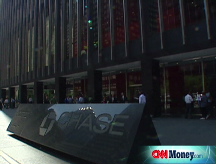In defense of short sellers
Investors who bet that stocks will fall are getting blamed by some for the current market mess. But it would be a huge mistake to crack down on the shorts.

NEW YORK (CNNMoney.com) -- There is a lot of negativity on Wall Street right now. But I don't think cracking down on short sellers is the solution to the market's woes.
It's easy to demonize short sellers, who make bets that stocks will go down. But short sellers, or "shorts" as they are more commonly referred to, are an important part of a healthy market. They keep companies and investors honest.
Typically, short sellers borrow shares, then sell them and hope to buy them back later at a lower price. They pocket the difference between the price at which they sold the shares and the price at which they bought them back.
The best shorts target companies that deserve to fall because their prices have been propped up by overexuberant traders (think of the dot.com bubble) or, in some cases, outright accounting irregularities and fraud.
Prominent short sellers such as David Tice, William Fleckenstein and James Chanos warned investors earlier this decade about companies such as Enron, WorldCom, Tyco and Adelphia, all firms that turned out to be propping up their earnings with shady bookkeeping.
At the very least, if more investors heeded short sellers' warnings on these stocks and avoided buying any of them, they could have been spared huge losses. And if they actually shorted some of these companies, they could have made out handsomely.
But with the crisis of confidence affecting financial stocks intensifying in the past week, people are now looking for scapegoats. And short sellers appear to be winning (or losing) the blame game.
The Securities and Exchange Commission issued an emergency order yesterday to curb so-called "naked" short selling in shares of beleaguered mortgage financing giants Fannie Mae (FNM, Fortune 500) and Freddie Mac (FRE, Fortune 500) as well as 17 other firms, including battered financials Citigroup (C, Fortune 500), Merrill Lynch (MER, Fortune 500) and Lehman Brothers (LEH, Fortune 500).
Naked short selling occurs when an investor shorts a stock before actually borrowing it. And to be sure, naked short selling has, in the past, occasionally been tied to market manipulation. But that's not always the case.
So it would be a huge mistake to tell short sellers that they can't target specific stocks. As we've since learned, shorting Bear Stearns was the prescient call.
The SEC's rule sets a dangerous precedent, namely that anytime a stock plunges, regulators will be there to slap the wrists of short sellers who may have legitimate reasons to believe that stock has more room to fall.
The issue for the SEC should not be attacking the shorts but fighting any form of illegal trading. And that can go both ways.
There is no difference in my mind between someone who pumps up a stock's value by falsely talking up the company's prospects or cooking the books and someone who tries to get a stock to fall by spreading untrue negative rumors about the company.
The issue is using illegal tactics to move a stock in either direction, not short selling per se.
Regular readers of this column know that I've been trying to keep a level head as of late and have been urging people to stay calm. I've even pointed out that short selling has been one factor in the market's recent slide and that investors shouldn't make the free fall worse by selling into a panic.
But make no mistake. I have the utmost respect for shorts who do their homework So the worst thing that regulators could do is make it more difficult for the sleuths out there who are trying to identify stocks that are overvalued and/or have serious fundamental problems.
The only way that a truly free market can work is if investors have the power to buy a stock if they think it will go up and short if they think it will go down.
Adding restrictions to curb short selling would just do a disservice to the overall market and might prevent people from learning about the next Enron or WorldCom before it's too late.
Issue #1 - America's Money: All this week at noon ET, CNN explains how the weakening economy affects you. Full coverage.
Have you had to raise cash this year for an unexpected expense? We're looking for people who got the cash by doing one of the following: Took out a home-equity loan, borrowed money from family or friends, borrowed against a retirement account such as a 401(k), sold a life-insurance policy. Is that you?
Drop us a line at realpeople@moneymail.com, and you may be spotlighted in Money magazine and on CNNMoney.com. Please tell us why you needed the cash, how much cash you raised by doing it, when you did it and if you were happy with your decision. Also please include your name, age, city, contact information and a recent family photo. ![]()




